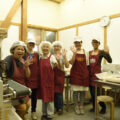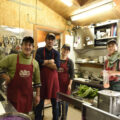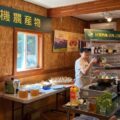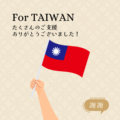- ブログ
プラスチック・フリー・ジュライ
Plastic Free July
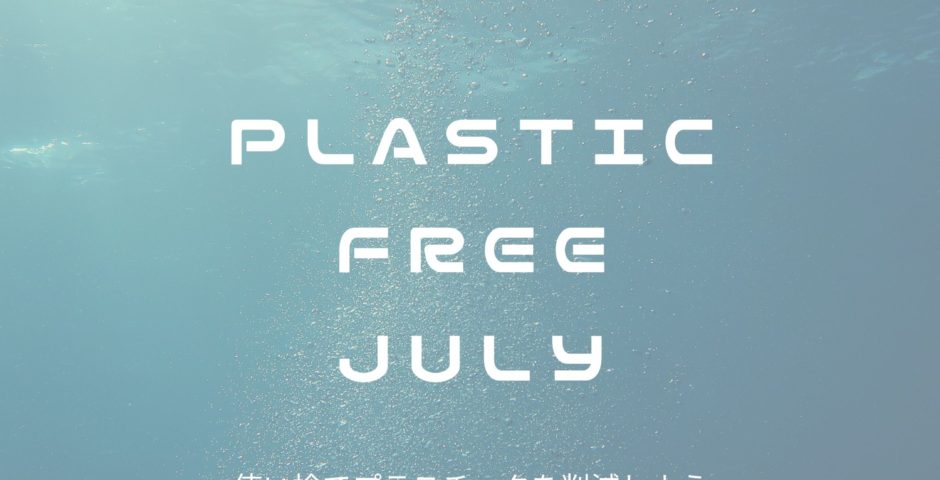
世界中で話題となっている環境問題。中でもとりわけ注目されているのがプラスチックによる環境汚染ではないでしょうか。鼻にプラスチックストローが刺さっている状態で見つかった海亀や、プラスチックの輪が口にはまったまま死んでいるアザラシの衝撃的な写真を見たことがある方も多いかもしれません。
Environmental problems have become a hot topic all over the world. Of these, the one that is attracting particular attention is the environmental pollution caused by plastics. You may have seen shocking pictures of sea turtles found with a plastic straw stuck in their nose and dead seals with a plastic ring stuck in their mouth.
プラスチックによる環境問題がニュースなどで取り上げられる際は、前出のような野生の生き物に関することが多く、注目を集めやすいと思いますが、プラスチックが起こす問題は具体的にはどういったことがあるのでしょうか。
正しく回収されなかったり、風で川へ飛ばされると、ゴミは流され海にたどり着きます。こうして増える海洋プラスチックは年間800万トンも発生しており、すでに海に存在するゴミの総量は1億5000万トンに達していると言われています。海の中には、ビニール袋のように目に見えるものと、5mm以下の小さな粒子となって漂っているマイクロプラスチックと呼ばれる物があります。マイクロプラスチックは、ビニール袋などが紫外線に当たったり波などで揉まれることにより小さくなる場合と、歯磨き粉や洗顔料内のスクラブのように、製造された時から細かな粒子になっている物があります。マイクロプラスチックを魚などが食べてしまうと、消化されずに体内に蓄積されます。もちろん、その魚を口にする私たちの体内にもマイクロプラスチックが入り込む可能性があります。
私たちが身体にマイクロプラスチックを取り込む可能性があるのは、魚や魚介類経由だけではありません。韓国の研究者グループと環境保護団体「グリーンピース東アジア」の合同チームが実施した塩に関する研究結果によると、調査対象となった39種類の食塩のうち、36種類からマイクロプラスチックが発見されたそうです。もう、至る所にマイクロプラスチックが広がってしまっていると考えて間違いなさそうな結果だと思いませんか。海にすでに広がったマイクロプラスチックを回収することは不可能であり、これから私たちが出来ることはいかにこれ以上流出することを食い止めるか、と言うことです。
When environmental problems caused by plastic are featured in the news, they are often related to wild creatures such as those mentioned above. Those kinds of events easily attract attention, but what are the specific problems caused by plastics?
If not collected properly or if blown into the river by the wind, garbage will be washed into the sea. It is said that 8 million tons of marine plastics are generated annually, and the total amount of garbage already in the sea has reached 150 million tons. In the ocean, there are things that look like plastic bags and things called microplastics that float as small particles of 5 mm or less in diameter. Microplastics can be made smaller when plastic bags are exposed to ultraviolet rays or tossed about by waves, or they may begin as fine particles from the time they are manufactured, such as toothpaste and scrubs in facial cleansers. When fish eat microplastics, they are not digested and accumulate in the body. Then when we eat the fish, microplastics enter our own bodies.
It’s not just through fish and seafood that we can get microplastics into our bodies. According to the results of a salt study conducted by a joint team of a group of Korean researchers and the environmental protection group “Greenpeace East Asia”, microplastics were found in 36 of the 39 types of salt surveyed. Based on this result, isn’t it accurate to believe that microplastics have spread everywhere? It is impossible to recover microplastics that have already reached the ocean, so all we can do now is figure out how to stop further spills.
日本でも昨年の7月からレジ袋有料化が始まり、プラスチックゴミに対する意識が少しは高まったかもしれませんが、今までは無料でもらえていた ‘ゴミ袋’ がもらえなくなったことにより、購入していると言う方も多いようで、レジ袋無料化がどの程度プラスチック削減効果を生み出しているかは疑問があります。プラスチックの削減に同意した国々の中でも一際アクションを起こしているのがフランスです。フランスでは、2016年にはプラスチック製レジ袋が廃止になり、その後レジ袋以外のビニール袋や、使い捨て食器、マイクロビーズを含む化粧品、家庭用のプラスチック製綿棒など、次々と販売が禁止となりました。法律などで取り締まられていない日本で大切なのは個人個人の意識と行動ではないでしょうか。
In Japan, the charge for plastic shopping bags began in July of last year. However, it is questionable what kind of effect the plastic shopping bag fee has produced. Awareness of plastic trash may have risen a little, but it seems that many people have simply started purchasing the ‘garbage bag’ that they can no longer get for free. Among the countries that have agreed to reduce plastics, France is taking the most action. In France, plastic shopping bags were abolished in 2016, and afterwards, sales of plastic bags other than plastic shopping bags, disposable tableware, cosmetics containing microbeads, plastic cotton sticks for home use, etc. were banned one after another. In contrast, for Japan, where plastic bag usage is largely unregulated, isn’t individual awareness and behavior important?
毎年7月は世界中で「プラスチック・フリー・ジュライ」と呼ばるムーブメント及び参加型エコ活動が実施されます。使い捨てプラスチックの利用を減らすことに一人一人ができるだけ努力する期間です。
3R〔リサイクル、リユース(再利用)、リデュース(削減)〕の中で最も重要なのはプラスチック消費を “削減する” こと。まずは身近なプラスチック用品を他の素材で出来た物に置き換えてみませんか。
<例>
プラスチックストロー ▶︎ ステンレスストロー
買い物用ビニール袋 ▶︎ 布製マイバッグ
プラスチックラップ ▶︎ 蜜蝋布ラップ 、シリコンラップ
タッパー ▶︎ ジャムなどの空き瓶
ペットボトル入り飲料水 ▶︎ 水筒・マイボトルを使用
ステンレス製ストローの生産者である「のーぷら」は、2017年より日本でプラスチックのない社会を推進するソーシャルベンチャーです。
7月中に、テングナチュラルフーズ、または阿里山カフェにてステンレスストロー、スタッシャーバッグ、Lemonaidシリーズのキャップ(ソープポンプ、もしくはディスペンサー)をご購入いただきますと、1点につき¥200がNPO法人UMINARIに寄付されます。
NPO法人UMINARIは、これからの未来を担うZ世代の若者たちが中心となって海洋環境改善に取り組んでおり、ビーチクリーンのイベント企画のほか、学校や企業での教育活動にも力を入れています。アリサンは2020年よりUMINARIを応援しています。
また、私たちはこの期間を使って「使い捨て」にまつわる意識と課題についてのアンケートを実施しています。WEBアンケートにお答えいただいた方の中から5名にプラスチックフリーの生活を後押しするグッズの詰め合わせをプレゼントいたします。ぜひご参加ください。
Every July, let’s participate in the global movement to cut down on single-use plastics.
The most important thing in the 3Rs [recycling, reuse, reduce] is to “reduce” plastic consumption. To start, why not replace familiar plastic supplies with those made of other materials?
<Example>
Plastic straw ▶ ︎Stainless steel straw
Plastic bag for shopping ▶ ︎ Reusable bags made of cloth
Plastic wrap ▶ ︎ Beeswax cloth wrap, silicone wrap
Tupperware ▶ ︎ Reused jars
Drinking water in PET bottles ▶ ︎ Water bottles
Our supplier for stainless steel straws, No Plastic Japan is a social venture campaigning for a plastic-free society in Japan since 2017.
For every stainless straw, stasher bag, or Lemonaid series cap (soap pump or dispenser) purchased at Tengu Natural Foods or Alishan Cafe in July, 200 yen will be donated to the NPO UMINARI.
UMINARI, led by the young people of Generation Z, is working to improve the marine environment. It is also focusing on educational activities at schools and companies and planning beach clean events. Alishan has been supporting UMINARI since 2020.
We also use this period to conduct a survey about awareness and issues related to “disposable”. Five of the respondents to the WEB survey will receive an assortment of goods that will support the plastic-free life. Please join us.

